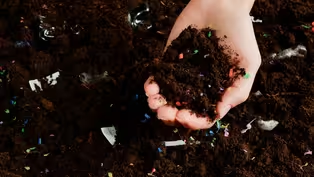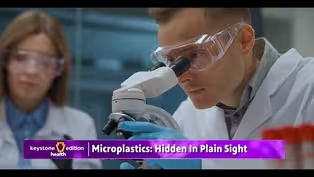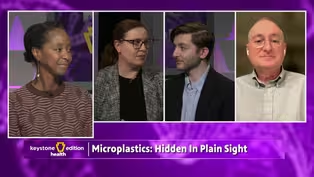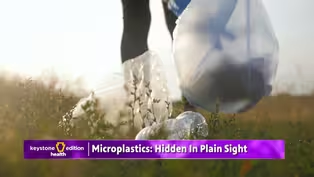Keystone Edition
Microplastics and Community Action: Restoring Our Rivers
Clip: 12/16/2024 | 2m 56sVideo has Closed Captions
Explore how you can make a difference for our waterways and planet.
Discover how microplastics are impacting our environment and what communities are doing to combat this growing problem in WVIA's Keystone Edition Health. Join John Mayday, volunteer Executive Director of the Riverfront Parks Committee, as he reflects on over three decades of efforts to clean and preserve the riverfront. Support for Keystone Edition Health provided by the Robert H. Spitz Foundation
Problems playing video? | Closed Captioning Feedback
Problems playing video? | Closed Captioning Feedback
Keystone Edition is a local public television program presented by WVIA
Keystone Edition
Microplastics and Community Action: Restoring Our Rivers
Clip: 12/16/2024 | 2m 56sVideo has Closed Captions
Discover how microplastics are impacting our environment and what communities are doing to combat this growing problem in WVIA's Keystone Edition Health. Join John Mayday, volunteer Executive Director of the Riverfront Parks Committee, as he reflects on over three decades of efforts to clean and preserve the riverfront. Support for Keystone Edition Health provided by the Robert H. Spitz Foundation
Problems playing video? | Closed Captioning Feedback
How to Watch Keystone Edition
Keystone Edition is available to stream on pbs.org and the free PBS App, available on iPhone, Apple TV, Android TV, Android smartphones, Amazon Fire TV, Amazon Fire Tablet, Roku, Samsung Smart TV, and Vizio.
Providing Support for PBS.org
Learn Moreabout PBS online sponsorshipMicroplastics in the water have increasingly become a problem.
By 2050, there will be more plastic containers, pieces by volume than fish in all the oceans of the world.
Anything that's grown here, high water event, it's going to end up in the river.
You could be so far removed from here.
You could be seeing Mountain Top or in the Back Mountain.
Anything around there will get caught up and end up in another stream that will end up in the river.
So that's one of the reasons we do this type of work.
My name is John Mayday.
I'm the volunteer executive director for the Riverfront Parks Committee.
Well, we, what we're walking through here is one of my favorite places because it overlooks the river and it overlooks, the, the Market Street bridge.
You'll notice, some of these trees that are planted here.
We planted these through here, through some of our Earth Day events.
Oh, they do a little fishing.
Good.
You know, when I come down here, when I'm down through here, when we do our cleanups, I'm always reminded of that first day we were here.
When I was here.
You know, all these many years back in 1990 or so, when we had all that trash here and, you know, the major cleanup, 3 or 400 bags.
And now look where it is today.
It's really changed.
35 plus years ago, when we walked from the the arches of the Market Street bridge down towards the Olmstead Trail.
We picked about 400 bags of trash over the time that has diminished.
And that's to the work of all these volunteers.
35 years ago, people would say, it's a dump.
Look at it today it's pristine.
And that's because people became involved and helped out and worked at it.
People will come down here, stay late at night and dump stuff.
Some people will just dump bags of trash.
This is ending up in your food source.
The other thing is, animals and fish think they're food.
They eat them.
They can't digest.
They die if we don't act now.
Microplastics will keep breaking down and spreading, ending up in our rivers and into our oceans.
But by coming together, we've shown that we can make a difference.
When you're doing something.
Think about the impact of what it is you're doing, the consequences of your decision, and how you can make a difference.
Microplastics: Hidden in Plain Sight - Preview
Preview: 12/16/2024 | 30s | Watch Monday, December 16th at 7pm on WVIA TV (30s)
Microplastics - Suggestions and Solutions
Video has Closed Captions
Clip: 12/16/2024 | 12m 31s | See a citizen science project testing Pennsylvania waterways for microplastics, (12m 31s)
Uncovering the Dangers of Microplastics
Clip: 12/16/2024 | 8m 21s | Experts explain the dangers of microplastics—tiny plastic particles found in food, water, and air. (8m 21s)
Providing Support for PBS.org
Learn Moreabout PBS online sponsorship
- News and Public Affairs

Top journalists deliver compelling original analysis of the hour's headlines.

- News and Public Affairs

FRONTLINE is investigative journalism that questions, explains and changes our world.












Support for PBS provided by:
Keystone Edition is a local public television program presented by WVIA



